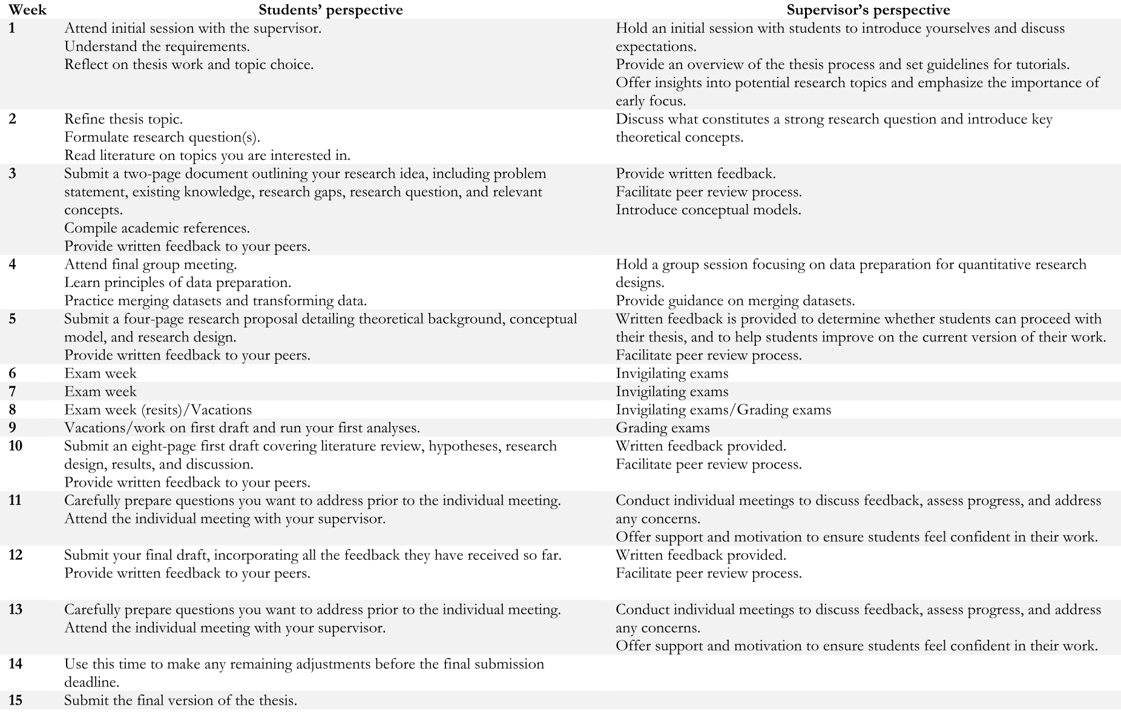Thesis schedule in case you have no intermediate deadlines (for students and supervisors)
Laetitia Em
3/29/20243 min read


Navigating the thesis journey without intermediate deadlines can be daunting for both students and supervisors. Whether you're a student taking the reins of your own schedule or a supervisor guiding BSc theses, establishing a structured schedule is key. While final submission dates may be set by the faculty, the flexibility to design the work schedule may rest in your hands. Drawing from my experience, here's a suggested breakdown of how to structure a semester for efficient thesis writing:
Week 1 – Introduction and Expectations Setting: Kickstarting with introductions and setting clear expectations. This initial session enables students to get acquainted with the group dynamics, their supervisor, and fellow peers. Discussions encompass personal backgrounds, program specifics, and initial thesis topic musings. Clear guidelines and rules for tutorial sessions are also established to foster a conducive learning environment.
Week 2 – Refining Research Questions: Moving into the second week, students should narrow down or refine their research topics. The focus shifts to formulating robust research questions, substantiated by academic references and logical reasoning. Class discussions delve into the characteristics of effective research questions and theories, enriching students' critical analysis skills.
Week 3 – Submission of Research Idea and Conceptual Models: The third session marks the submission of initial research ideas in a concise document format (about two pages). This includes articulating problem statements, identifying gaps in existing literature, proposing research questions, and relevant conceptual frameworks. Initiating peer review processes fosters collaborative learning and enhances students' analytical capabilities. Students also receive written comments on their work from their supervisor.
Week 4 – Data Preparation: With a quantitative research focus, this week emphasizes the principles of tidy data and data preparation techniques. Hands-on sessions equip students with essential skills to collect, merge, and format datasets for analysis, ensuring a robust empirical foundation for their theses.
Week 5 – Submission of Research Proposal: A pivotal milestone is reached with the submission of a comprehensive research proposal. This document, typically four pages long, outlines the theoretical underpinnings, conceptual frameworks, and research designs. Feedback loops from peers and supervisor aid students in refining their proposals for approval.
Weeks 6-9 – Exams, Breaks, and Empirical Analyses: A designated period for exams and vacations provides students with ample time to reflect on feedback and delve into empirical analyses. This period is crucial for data collection, analysis, and interpretation, ensuring the empirical robustness of their theses.
Week 10 – Submission of First Draft: Culminating weeks of collaborative efforts, students submit their first draft of the thesis. This comprehensive document encompasses literature reviews, hypotheses, research designs, results, and discussions, setting the stage for subsequent iterations. It should be about 8-page long. Again, it is reviewed by both peers and supervisor, providing different perspectives and constructive comments so the student knows what should be improved.
Week 11 – Individual Meetings and Progress Check: Supervisors can conduct individual meetings to discuss feedback, assess progress, and provide invaluable guidance and encouragement. These personalized interactions serve as a cornerstone for student motivation and success. Each individual meeting could last 20 minutes. Students, have your questions and topics of discussion ready, so you can benefit the most of this special time with your supervisor!
Week 12 – Submission of Final Draft: Students submit the final draft of their thesis, incorporating feedback from earlier stages. This polished version encompasses all components, ensuring completeness and coherence, ready for the final submission. Again, it is reviewed by both peers and supervisor, providing different perspectives and constructive comments so the student knows what should be improved before submitting the final submission at the end of the semester.
Weeks 13-15 – Final Checks and Individual Meetings: The concluding weeks are dedicated to final checks and individual meetings, offering students a final opportunity for guidance and refinement before the ultimate submission.
By adhering to this structured schedule, students can effectively manage their thesis writing process within the confines of a single semester. Supervisors play a pivotal role in providing guidance, feedback, and support, ensuring students navigate this journey successfully.


This is how I organized the semester for my BSc students. Please reach out if you have any comments! You can send me a message at contact@kopalis.com
contact@kopalis.com
To comply with the GDPR (General Data Protection Regulation) as of May 25, 2018, no login information is stored, and you have the right to be forgotten. Only information you have provided via email for processing and communication purposes is retained. You have the right to access and the right to be forgotten. No information is transmitted, sold, or exchanged.
